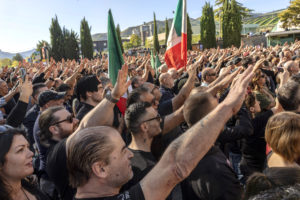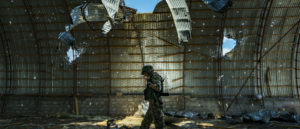A year ago, I met a man in Madrid who expected to be sued for body-snatching. He gave me the news with a shrug. It was the price, he said, of joining a socialist government that was drafting a new law to reshape the way Spain tells its 20th-century history of civil war and dictatorship under General Francisco Franco.
Among other measures, the authors of this new “democratic memory” law, which was finally passed in September, planned to remove some of the 34,000 corpses from Spain’s biggest civil war cemetery at the controversial Valley of the Fallen outside Madrid. Hence the threat of a private prosecution alleging body-snatching, or what Americans call “corpse theft”, brought by Franco’s ultra-Catholic supporters.
The disinterring of bodies should start later this year, so no body-snatching cases have yet been brought, but Spain is shaping up for a bruising history war in 2023. Franco died in 1975, almost half a century ago. So, why bother now?
Blatant government meddling in history is more easily associated with totalitarians than democrats, but it can cut both ways. Poland’s illiberal Law and Justice party, for example, uses its Institute of National Remembrance to implement “decommunisation” laws (the last one from 2017) that purge monuments, monsters and memory from its time in the Soviet bloc.
Yet Spain remains a special case. A country that never properly confronted its dark 20th-century history is trying to play catch up. The problem is that this comes too late.
After Franco’s death in 1975, Spain tried to forget the brutality of his regime. Fear that his military henchmen would strangle the country’s new democracy in its cradle meant that Franco’s people got a free pass, formalised by a 1977 amnesty law. There were no trials or truth commissions for up to 170,000 people killed off the civil war battlefields in the Thirties, or for the victims of four decades of state repression.
A new democratic Right led by former Francoist ministers wanted a complete break and moderates on the Left agreed. “There were implicit and explicit agreements. One was that we Spaniards don’t want to look to the past,” the first elected Right-wing prime minister, José María Aznar, declared two decades later.
Historians did their research, but schools, media and politicians stayed away. It became known as the “pact of forgetting”. If the past stank, the logic ran, why stick your nose into it?
Yet the smell lingers. Nowhere is it more fetid than in the gloomy, musty troglodyte basilica tunnelled out by Franco at the Valley of the Fallen, in the mountains 40 miles north of Madrid. This 260-metre long underground chamber is both a place of worship and home to those 34,000 war dead, whose bodies are hidden away in damp, crumbling chambers that no one can visit.
The new law wrests control of the site away from the Church, returning it to the state and formally erasing its name since this was imposed by Franco. He claimed to be honouring all the fallen of the war, but the fascistic iconography inside the basilica praises only his side. The “fallen” were stage props; the only visitable graves were Franco’s own, and that of the ideologue of the fascist Falange party that backed him, José Antonio Primo de Rivera. Little surprise, then, that the valley has had its ancient, pre-Franco place-name of Cuelgamuros restored.
Since the basilica took until 1959 to build, the dead of both sides of the civil war (1936-1939) were dug up from elsewhere, sometimes to the horror of their families — who will now be able to recover and rebury them closer to home (180 of them have already requested this).
A Benedictine monastery, hidden behind a granite outcrop topped by a 150-metre high stone cross, will also be closed. That sounds like an attack on religion, but we need not be fooled by the monks. For decades after Franco’s death, they said masses in his name and lobbied for the man whose doctrine became known as “national Catholicism” to be canonised.
On the November anniversary of his death, they would hand the basilica over to European fascists who sang their anthems and indulged in chilling, stiff-armed revelry of a kind unimaginable in any other place of worship outside of Putin’s Russia. That continued for four decades — and I occasionally went to watch —regardless of the fact that the monument belongs to the state.
Under the new law, public Francoist symbols and street names must be removed, or fines paid. The state will search for and disinter death squad victims from their often-secret graves and, in a symbolic gesture, strike out the sentences — some carried out by firing squad — which Franco’s retroactive justice imposed on elected officials of the democracy he overthrew.
Much else is also symbolic. Titles and medals awarded by Franco have been taken away. His victims will be listed and named. A DNA bank will allow relatives of those still missing to help identify the remaining corpses. Democratic memory will be taught at school — although no one knows how.
Since the Francoists are now all dead or doddery, there is little else to do. Nor is this the first attempt at dealing with the past. The 1977 amnesty was followed by a tepid “historical memory” law in 2007, which carried no sanctions, refused to name perpetrators of regime abuses and left governments to fund fieldwork, or not (Right-wing governments cut funds off when in power).
Such laws are usually passed to overcome recent trauma. When they arrive late, they risk failure. In his 2016 polemic, In Praise of Forgetting: Historical Memory and Its Ironies, David Rieff claimed they could even make things worse: “Remembrance may be the ally of justice, but, despite the conventional wisdom of the human rights movement, it is no reliable friend to peace, whereas forgetting can and at times has played such a role.”
Rieff produces some powerful arguments, not least the way genocidal Serb nationalists in the former Yugoslavia justified their cruelty by referring to the 1453 Ottoman conquest of Constantinople. In Spain’s case, however, peace is not at risk. “Forgetting is not an option in democracy,” the law states.
Shortly after Spain’s new law was passed, the Argentine-Spanish tech entrepreneur and investor Martin Varsavsky found himself at a Madrid dinner party arguing that Franco had been a uniformly bad thing. His was a lone voice; none of the other guests agreed. “Eleven people defending Franco against me arguing that on top of being a terrible dictatorship Franco kept Spain in the stone ages of social, political and economic development for 39 years,” Varsavsky tweeted.
Varsavsky was dining with that part of conservative Madrid society which believes a modest middle class that emerged from Francoism went on to “save” Spain from its long history of confrontation, backwardness and chaos by setting up democracy — and that the dictator should be thanked. This conveniently turns Franco’s winners and collaborationists (including, I suspect, the families of some dinner guests) into heroes.
Varsavsky may have been alone, but he was right. Franco overthrew an elected government, wrecked the economy and provoked half a million deaths. His war saw brutality on both sides, but the excuse that he saved Spain from political turmoil and a communist takeover is a lazy game of counterfactual history. Even today, few Spaniards realise that — despite a belated spurt of catch-up growth that is still presented as proof of overall brilliance — Francoism was an economic failure, pushing Spain further behind other southern European nations such as Italy (Spain’s per capita GDP, in relative terms to Italy, fell by a fifth during Franco’s years in power).
Given that there is barely anyone left to recompense or punish, Spain’s new law is very much about the present. In what its authors undoubtedly saw as a dig against Spain’s newly successful far-Right party Vox, the law aims “to avoid the repetition of any kind of political violence or totalitarianism”. Among other things, it lures opponents into the trap of defending Franco, just because they dislike socialist Prime Minister Pedro Sánchez and his coalition government with far-Left Podemos. “It is an ideologically-driven law that reopens the hatreds of the Civil War,” the leader of the moderate Right-wing People’s Party, Alberto Nuñez Feijoo, complains.
In fact, the law missed out on creating the best space for reconciliation — a national civil war museum where Spaniards could understand the horror and debate what it all meant, or still means. Spain has nothing of the kind. Civil war battle sites are either ignored or, worse still, built over.
The Valley of the Fallen, now Cuelgamuros, is the perfect place for that museum. Franco, whose own body was removed from its place of honour in the basilica by Sánchez’s government in 2018, cynically claimed he had built it to be a place of reconciliation. Fifty years later, an opportunity has been missed to make it exactly that.
Disclaimer
Some of the posts we share are controversial and we do not necessarily agree with them in the whole extend. Sometimes we agree with the content or part of it but we do not agree with the narration or language. Nevertheless we find them somehow interesting, valuable and/or informative or we share them, because we strongly believe in freedom of speech, free press and journalism. We strongly encourage you to have a critical approach to all the content, do your own research and analysis to build your own opinion.
We would be glad to have your feedback.
Source: UnHerd Read the original article here: https://unherd.com/





